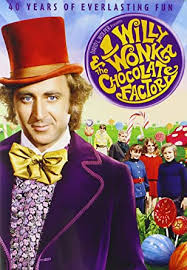
Charlie Bucket (Peter Ostrum) is an average kid, but a poor kid, from a small town. In this town is a candy factory owned by Willy Wonka (Gene Wilder). Years ago Wonka, trying to keep out spies that want to steal his candy recipes, locked down the factory. No one is allowed in, and no one comes out. Three years later the factory started making candy again but no one knows who works there. Charlie’s Grandpa Joe (Jack Albertson) tells him about the mysterious factory.
Suddenly Wonka announces that he has created a contest. He has hidden five golden tickets in five Wonka chocolate bars. The chocolate bars are spread all over the world. The five lucky children that find the golden tickets get a tour of his factory and a lifetime supply of chocolate. Each child is allowed to take one adult with them into the factory. People from everywhere buy up all the Wonka bars they can get their hands on. Charlie is one of them. Short on money, he can only get a couple bars, but has no luck.
The first ticket is found in Germany by Augustus Gloop (Michael Boollner). Augustus is a glutton and so are his parents. Augustus’s mother (Ursula Reit) accompanies her son to the factory. The second ticket is found by someone who works for Mr. Salt (Roy Kinnear). His spoiled daughter Veruca (Julie Dawn Cole) wants a golden ticket and what Veruca wants, Veruca gets. Mr. Salt has shut down his factory and purchased thousands of Willy Wonka Bars. All his workers did was open bars of chocolate so that Veruca could get a ticket. Mr. Salt takes his daughter to the factory. The third ticket was found by Violet Beauregarde (Denise Nickerson). She prefers to chew gum but to get a golden ticket she switched. Once she got a ticket she went back to gum. She is accompanied to the factory by her father (Leonard Stone). The fourth ticket is found by Mike Teavee (Paris Themmen). He is a television addict. He is joined by his mother (Nora Denney) for the trip to the factory.
At first it is announced in the news that the fifth golden ticket was found by a millionaire casino owner from Paraguay. Charlie is a little disheartened at the news. Finding some change in the street he buys a couple candy bars to enjoy. Not long after that it is announced that the fifth ticket was a forgery. Charlie opens his last candy bar and finds the golden ticket. He races home to tell everyone. Charlie decides to take Grandpa Joe with him on his factory tour.
The next day is the day for the scheduled tour. Charlie and Grandpa Joe wait with the others for their tour. They get their tour and a lot more than they expected. Sometimes enchanting and sometimes frightening the five ticket winners, due to “accidents”, are drastically eliminated one by one.
“Willy Wonka and the Chocolate Factory” was released in 1971 and was directed by Mel Stuart. The film was based on a book by Roald Dahl. It is part musical children’s fantasy and part horror story. Although the story is enchanting and the songs are light there is, at times, and undertone of dark and evil. Gene Wilder as the enigmatic Wonka is charming, polite, startling, terrifying and sometimes downright maniacal. He is a contradiction in personalities, sometimes childlike and sometimes jaded.
The visuals are also a mixture of pure delight and slightly nightmare. One minute you are in a garden of edible delights and the next in a dark horror-house tunnel with horrific images all around and Gene Wilder insanely ranting. Are you in a wonderland or an evil dream? Whichever it is, you won’t forget it.
It was director Mel Stuart’s ten year old daughter’s idea to make the book a movie. She asked him to have “Uncle Dave”, David Wolper, produce it. Stuart paid her fifty dollars for the advice.
In the film the character Violet has to turn blue. Since CGI was not around at the time the effect was done by a color layering process. Later the process was perfected enough to be use in the 1977 film Star Wars: Episode IV-A New Hope. It was used to make the light saber color effect.
Aubrey Woods, who played Bill the sweet shop owner, also played The Controller in the Doctor Who (1963) serial "Day of the Daleks". Jon Pertwee, who was The Doctor in the show at the time, had been offered the role of Willy Wonka. He had to turn the role down, due to his commitment to the series.
There are ten Oompa Loompas in the film. One of them female.
In 1972 Sammy David Jr. did a recording of the song “The Candy Man” from “Willy Wonka and the Chocolate Factory”. He hated the song and refused to do more than one take. It became his only number one hit.

